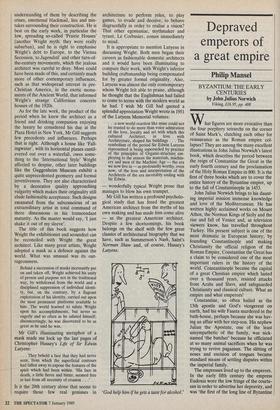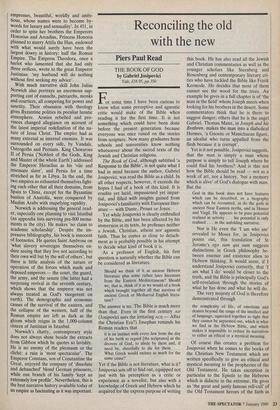Depraved emperors of a great empire
Philip Mansel
BYZANTIUM: THE EARLY CENTURIES by John Julius Norwich Viking, £16.95, pp. 408 What figures are more evocative than the four porphyry tetrarchs on the corner of Saint Mark's, clutching each other for reassurance as the Roman empire col- lapses? They are among the many excellent illustrations in John Julius Norwich's latest book, which describes the period between the reign of Constantine the Great in the early fourth century and the proclamation of the Holy Roman Empire in 800. It is the first of three books which are to cover the entire history of the Byzantine empire, up to the fall of Constantinople in 1453.
John Julius Norwich brings to his daunt- ing imperial mission immense knowledge and love of the Mediterranean. He has written highly acclaimed works on Mount Athos, the Norman Kings of Sicily and the rise and fall of Venice and, as television viewers know, has travelled throughout Turkey. His present subject is one of the most dramatic in European history; by founding Constantinople and making Christianity the official religion of the Roman Empire, Constantine the Great has a claim to be considered one of the most important rulers in the history of the world. Constantinople became the capital of a great Christian empire which lasted over a thousand years, resisted attacks from Arabs and Slays, and safeguarded Christianity and classical culture. What an empire and what emperors!
Constantine, so often hailed as the 13th apostle and God's vicegerent on earth, had his wife Fausta murdered in the bath-house, perhaps because she was hav- ing an affair with her step-son. His nephew Julian the Apostate, one of the least unsympathetic of the family, was nick- named 'the butcher' because he officiated at so many animal sacrifices when he was trying to revive paganism. The slitting of noses and excision of tongues became standard means of settling disputes within the imperial family.
The empresses lived up to the emperors. In the early fifth century the empress Eudoxia wore the low fringe of the courte- san in order to advertise her depravity, and was 'the first of the long line of Byzantine empresses, beautiful, worldly and ambi- tious, whose names were to become by- words for luxury and sensuality'. In 451, in order to spite her brothers the Emperors Honorius and Arcadius, Princess Honoria planned to marry Attila the Hun, endowed with what would surely have been the largest dowry in history: half the Roman Empire. The Empress Theodora, once a harlot who lamented that she had only three orifices, wrote to the great Emperor Justinian: 'my husband will do nothing without first seeking my advice'.
With much narrative skill John Julius Norwich also portrays an enormous sup- porting cast of eunuchs, patriarchs, monks and courtiers, all competing for power and sanctity. Their obsession with theology gives Byzantine politics its peculiar lunatic atmosphere. Armies rebelled and pro- vinces changed allegiance on account of the latest imperial redefinition of the na- ture of Jesus Christ. The empire had as many external as internal enemies. It was surrounded on every side, by Vandals, Ostrogoths and Persians. King Choesroes II of Persia (Noblest of the Gods, King and Master of the whole Earth') addressed the Emperor Heraclius as his 'vile and insensate slave', and Persia for a time stretched as far as Libya. In the end, the two empires so exhausted themselves fight- ing each other that all their domains, from Spain to China, except for the Byzantine bastion of Anatolia, were conquered by Muslim Arabs with stupefying rapidity.
Norwich is addressing the general read- er, especially one planning to visit Istanbul (an appendix lists surviving pre-800 monu- ments in the city). He makes `no claim to academic scholarship'. Despite the im- pressive bibliography, his book is innocent of footnotes. He quotes Saint Ambrose on `What slavery sovereigns themselves en- dure seeing that they live not according to their own will but by the will of others', but there is little analysis of the nature or operation of the forces which made and deposed emperors — the court, the guard, the army, and the senate (the latter had a surprising revival in the seventh century, which shows that the emperor was not always treated as God's vicegerent on earth). The demographic and economic causes of the survival of the eastern, and the collapse of the western, half of the Roman empire are left as dark as the gloom which reigns in the 1,000-column cistern of Justinian in Istanbul.
Norwich's chatty, contemporary style does not always shine beside the extracts from Gibbon which he quotes so lavishly. He is no enemy of the pleonasm or the cliché: a ruin is 'most spectacular'. The Emperor Constans, son of Constantine the Great, enjoyed the company of 'dissolute and debauched' blond German prisoners, while one branch of his family 'kept an extremely low profile'. Nevertheless, this is the best narrative history available today of an empire as fascinating as it was important.











































 Previous page
Previous page